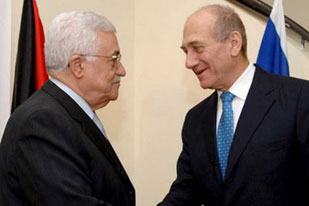Q&A: Annapolis
A look at the issues behind the US-sponsored conference in Maryland.

 |
| The Israeli and Palestinian sides were unable to agree a joint declaration before of the talks [EPA] |
Hoping to claim an achievement in the Middle East before he leaves office in 2009, George Bush, the US president, is hosting talks between the Palestinian and Israeli leaders at Annapolis in Maryland.
Representatives from nearly 50 nations and international groups will also be present, but expectations of the conference are low.
Al Jazeera takes a look at some of the key points behind the US-sponsored conference.
What is the goal of Annapolis?
The US hopes renewed talks will lead to a peace deal before Bush leaves office in January 2009.
Peace talks broke down in violence seven years ago, but Bush wants Ehud Olmert, the Israeli prime minister, and Mahmoud Abbas, the Palestinian president, to declare a formal resumption of the talks in front of a large international audience.
Why now?
| In depth |
Bush proposed the conference last summer, shortly after Hamas routed pro-Abbas forces and seized control of the Gaza Strip.
The US is eager to bolster Abbas in his rivalry with the Hamas faction and wants to send a message to Iran, which supports Hamas and other groups and which the US views as the main source of instability in the region.
Who will be at Annapolis?
Participants from nearly 50 countries will attend, including Ban Ki-moon, the UN secretary-general; Tony Blair, the former British prime minister who now serves as the international community’s Middle East envoy; Amr Moussa, secretary-general of the Arab League; as well as top officials from Saudi Arabia, Syria, Egypt, Jordan and the EU.
Arab participation, particularly by nations that do not have relations with Israel, is considered essential to the talks’ success.
What have been the obstacles in preparations?
Israel and the Palestinians had hoped to present a joint declaration at the conference outlining their vision of a future peace agreement, but months of negotiations have made little progress.
The Palestinians want the statement to address, at least in general terms, the core issues at the heart of the conflict with Israel. They have also sought a deadline for a peace deal.
The Israelis want a much vaguer declaration without a firm timetable. However, Olmert says he is ready to begin discussing core issues immediately after Annapolis and says he believes a deal can be reached next year.
What are the core issues?
The Palestinians want to form an independent state that includes the West Bank, Gaza and east Jerusalem – the areas captured by Israel in the 1967 war – and would have east Jerusalem as its capital.
 |
| The row over the status of Jerusalem has stalled negotiations in the past [EPA] |
A peace agreement must work out the final borders of the Palestinian state, the status of Jerusalem and the fate of millions of Palestinian refugees who lost their homes during fighting when Israel was created in 1948.
Israel wants to retain parts of the war-won land where some 450,000 Israelis live today. It also opposes any return of Palestinian refugees to Israel.
Olmert has signalled he is ready to relinquish outlying Arab neighbourhoods of the city, but he wants Jerusalem’s Old City – home to Jewish, Christian and Muslim holy sites – to remain under Israeli control.
The dispute over the status of Jerusalem has derailed peace talks in the past.
What are the chances of success?
Opinion polls show majorities on both sides favour a settlement and with Bush, Olmert and Abbas all suffering low opinion ratings, the three leaders are hungry for an achievement.
Some Arab nations also appear ready to provide their support to counter Iran’s influence in the region.
What obstacles remain?
Israeli and Palestinian negotiators remain some distance apart on the core issues.
If talks make progress, Olmert could run into trouble with his coalition partners, who have threatened to bring down the government if he makes too many concessions.
On the Palestinian side, Hamas, which opposes a deal with Israel, remains firmly in control of Gaza, raising questions about Abbas’s ability to carry out any peace agreement.
